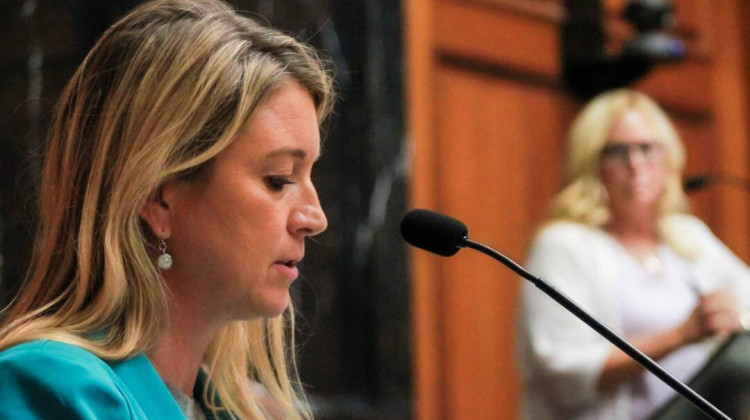
The agreement removes the immediate threat of an economy-devastating strike that union UPS workers said they hoped to avoid as much as business and political leaders.
Adam Yahya Rayes/IPB NewsThe Teamsters Union and UPS announced a tentative national agreement with less than a week left before a potential strike. UPS workers in Indiana and across the country will get to vote on the proposed five-year contract for three weeks, until August 22.
A dispute over part-time pay was the last thing holding up negotiations. After a tense few weeks, the tentative agreement announced Tuesday by the company and union guarantees part-timers at least $21 an hour.
Negotiations broke down earlier this month after union leaders said the company refused to budge on its part time pay proposal, which Teamsters International President Sean O’Brien alleged would have resulted in “zero or little” wage increases for thousands of part-timers.
“UPS came dangerously close to putting itself on strike, but we kept firm on our demands. … I have never seen a national contract that levels the playing field for workers so dramatically as this one,” said Teamsters General Secretary-Treasurer Fred Zuckerman in a statement. “We stayed focused on our members and fought like hell to get everything that full-time and part-time UPS Teamsters deserve.”
Along with the $21 minimum hourly wage for part-timers, the proposed contract would now guarantee “$2.75 more per hour in 2023, and $7.50 more per hour over the length of the contract” for both part- and full-time workers.
If the contract is approved, some changes will go into effect immediately — others over the course of five years. If workers vote it down, both parties will likely go back to the negotiating table with the threat of a strike looming again.
In a statement, UPS CEO Carol B. Tomé said the new tentative agreement is a “win-win” and “continues to reward UPS’s full- and part-time employees with industry-leading pay and benefits while retaining the flexibility we need to stay competitive, serve our customers and keep our business strong.”
The Teamsters National Negotiating Committee unanimously endorsed the contract. The agreement removes the immediate threat of an economy-devastating strike that business and political leaders hoped to avoid.
UPS workers at a practice picket line in Indianapolis last week said they also didn’t want to strike. Donna McCullar, 25-year part-time employee and union steward, was among them.
“I just want us to go ahead and get this contract resolved without going on strike,” McCullar said. “And I would hate to see a lot of people go under because of the fact that UPS is playing around with their livelihood.”
But she and others said they were ready to strike to ensure protections and higher wages for part-time workers.
“It's up to [UPS CEO Tomé] to meet Teamsters’ [demands], not the other way around,” McCullar said. “I just want her to know that these are the people that pay your paycheck … the [investors] that buy shares in the company, this is how they all get paid.”
Other parts of this tentative agreement were reached long before Tuesday, including a provision requiring air conditioning in all new delivery vehicles added to the company’s fleet after Jan. 1, 2024. Workers like McCullar say they’ve needed that for a long time. McCullar, who used to work as a driver but now works in a facility, said she was surprised the union got UPS to agree to that protection.
“It's bad. We've had some drivers faint, things like that,” she said. “But with air conditioning that they're putting in place, I do believe that's going to help out a lot when it comes to people's health.”
Join the conversation and sign up for the Indiana Two-Way. Text "Indiana" to 73224. Your comments and questions in response to our weekly text help us find the answers you need on statewide issues.
When previously asked about heat concerns by Indiana Public Broadcasting, a spokesperson pointed to statements posted online that said the company was working to address heat issues by creating “cooling sleeves and hats” for workers, “increasing access to ice, cool water and electrolytes beverages” and adding fans to vehicles and facilities.
After the Teamsters announced UPS tentatively agreed to add air conditioning, the spokesperson did not respond to questions about why the company was willing to add air conditioning now but didn’t do so when there were reports of dozens of workers being hospitalized due to heat exposure over the past few years.
They also declined to answer whether the change reflected an acknowledgment that non-air conditioning measures taken on by the company in recent years were not enough alone, as workers and critics have suggested.
Muncie UPS driver Jeffery Hazzard recalled the difficulty of working in 90-degree weather during a July interview. There is a fan in the vehicle he delivers packages in, but he said the fan “is blowing the heat and humidity just around.”
It’s not clear how many workers will get to drive the new air-conditioned vehicles and how many will still be using the old ones with fans added to them. The company agreed to add additional fans and other heat-reduction measures to the existing vehicles.
Other changes in the tentative agreement include making the "average top rate" for full-time delivery drivers $49 per hour, giving workers Martin Luther King Jr. Day off, prohibiting forced overtime on drivers' days off and "the creation of 7,500 new full-time Teamster jobs at UPS."
Adam is our labor and employment reporter. Contact him at arayes@wvpe.org or follow him on Twitter at @arayesIPB.
9(MDAyMzk1MzA4MDE2MjY3OTY1MjM5ZDJjYQ000))
 DONATE
DONATE






 Support WFYI. We can't do it without you.
Support WFYI. We can't do it without you.